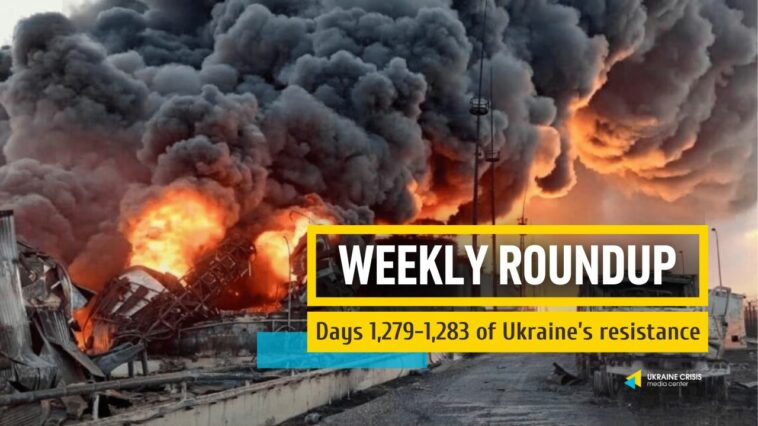This week, fighting continued to rage all along the front lines. There’s a growing understanding that the diplomatic efforts to bring the war to an end have settled into a stalemate.
Ukraine recaptured the village of Novomykhaylivka, in Donetsk region and threw Russian forces back in Zelenyi Hai, Ukrainian OSINT project DeepState, said on Monday. Russia has failed to exploit the penetration toward Dobropillya, north of Pokrovsk, in Donetsk region, to establish enduring positions there, the Institute for the Study of War (ISW) said, noting Ukrainian counterattacks in the area.
Ukraine develops missiles that can travel 1,000-3,000 kilometers. The Long Neptune and Flamingo are among the ones that were recently revealed to the public. Ukraine and Canada signed a deal on joint defense production. This week, German Vice Chancellor Lars Klingbeil and Ukrainian President Volodymyr Zelenskyi discussed the progress being made to purchase two Patriot air defense systems and to provide additional German-made IRIS-T air defenses to Ukraine.
Ukraine continues to conduct strikes on military and energy facilities deep inside Russia. An explosion rocked a pipeline in the Ryazan region on Wednesday. The line supplies fuel to Moscow. Late in the week, Ukraine’s defense intelligence hit Russia’s Buyan-M class corvette with drones in the Azov Sea. The vessel can launch Kalibr cruise missiles.
The Putin-Zelenskyi meeting is in a stalemate, according to Bloomberg News. The Kremlin would reject a U.S. and European proposal of security guarantees for Ukraine, ISW says. Russia set a new record for war spending, the German Institute for International and Security Affairs found.
Russia carried out a major missile and drone attack on Kyiv overnight into Thursday, killing at least 23 people, including four children, and wounding more than 50 others. The strikes damaged dozens of residential and other buildings across several districts in the city. In Darnytskyi district, a whole section of a five-story building was wiped out and the upper floors were destroyed.
Ukraine drone strikes disrupt 21 per cent of Russia’s fuel production capacities in past two weeks, Ukraine commander says.
Ukrainian drone strikes disrupted another 4.7 per cent of Russia’s fuel production capacities overnight on Thursday, commander of Ukraine’s Unmanned Systems Forces, Major Robert Brovdi who goes by the call sign Magyar said in a post to Telegram on August 28.
Brovdi used a metaphoric phrase to deliver the news, comparing a blow to Russia’s oil revenues to the damage of a needle that keeps the mythical character, Koshey, alive. “The Koshey’s needle nervously got 4.7 per cent thinner last night,” he said.
He also said his units were responsible for striking the Kuybyshevsky and Afipsky oil refineries with drones. The Kuybyshevsky oil refinery in the Samara region has a processing capacity of 7 million tons of oil per year and accounts for 2.5 per cent of Russia’s overall output. The attack was carried out by the 14th regiment of the Unmanned Systems Forces called Birds’ Sting (Zhalo Ptakhiv) jointly with the Special Operations Forces.
The annual production capacity of the Afipsky oil refinery in the Krasnodar region stands at 6.25 million tons. The plant accounts for 2.2 per cent of Russia’s total output. The facility was struck in a joint operation of the Birds’ Sting unit and Ukraine’s defense intelligence.
Brovdi said Russia’s “gas station” lost 21 per cent in the past two weeks. It creates gasoline shortages and makes the authorities burn oil and gas faster, he added.
Ukraine struck the Ust-Luga fuel export terminal and the Syzransky oil refinery in the Samara region on August 24, the General Staff of the Ukrainian Armed Forces said. The port of Ust-Luga is one of Russia’s key parts of the oil export route via the Baltic Sea. It plays a vital role in Russia’s oil exports with its shadow fleet that it uses to circumvent sanctions. The Syzransky oil refinery has a processing capacity of up to 8.5 million tons of oil per year and accounts for around 3.08 per cent of Russia’s overall output. Its contribution positions it as a key facility in the sector.
In a report on August 26, the Institute for the Study of War said that recent Ukrainian strikes on Russia’s oil refineries have contributed to gasoline shortages across Russia that will likely raise inflation and cause further macroeconomic instability in Russia.




